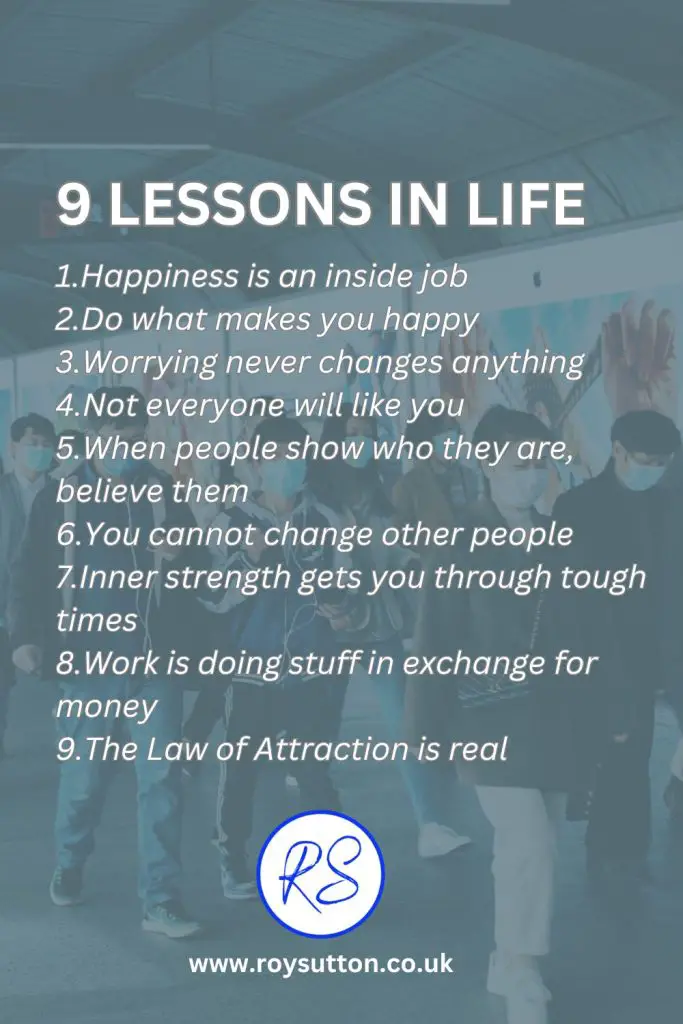
Life has many lessons, but today I thought I’d offer nine lessons in life we must all learn, the sooner the better.
Life is tough for everyone, and it’s even tougher for some.
It will never be perfect, but it can be good, and you can have a life you can enjoy. However, you’d be wise to learn these lessons first.

Lessons in life:
1. Happiness is an inside job
Being happy is a state of mind.
It doesn’t come from possessions. Nor does it come from other people.
If you think money will make you happy, it won’t.
These things are all nice to have, but they don’t, by themselves, make you happy.
Happiness starts with appreciating what you have right now and the people you already have in your life.
Friends and loved ones are of great importance to us all, even if we don’t have many of them.
Happiness comes from appreciating the job you have. And the best way to appreciate your job is to think about what life would be like if you didn’t have a job.
No job means no income, and without an income, life would get tough.
Your life won’t be perfect, but that’s true for everyone. No one’s life is perfect.
Everyone has problems and challenges. That’s the nature of human existence.
So, don’t wait for something in the future to make you happy. Start appreciating what you have today.
Simple things like a coffee with a friend or watching a television show you enjoy.
Make a positive decision to be happy, and look for the best in everything.
2. Do what makes you happy
It’s easy to assume that everyone else’s life is wonderful and, for whatever reason, yours isn’t.
Social media has a lot to answer for. People share clips of ‘how wonderful’ their lives are, but it’s all just an illusion.
No one’s life is perfect. So, don’t compare yourself to anyone else, either on social media or in real life.
Do things that make you happy.
If you enjoy watching a soap opera on television, then watch it. Forget what other people think about it. Who cares whether they like it or not? The only thing that matters is that you like it.
If you enjoy drinking tea and everyone else drinks coffee, so what? You drink the beverage you prefer.
You don’t have to conform to everyone else’s likes and dislikes. It’s your life, and you’re free to live it your way, as long as you’re not hurting anyone else.
So, just live life in a way that makes you happy.
And remember: You don’t want to live forever, but you do want to live life to the full each day. It’s your life, and you only get to live it once. So, live it now!
3. Worrying has never changed anything
It’s natural when there’s a significant problem in your life to worry about it. However, have you ever solved a problem by worrying? No is the answer.
Worrying just makes the present moment worse. It just makes you feel bad.
So why worry?
Yes, of course, you will still have to deal with the problem. However, try to remain positive. The problem may resolve itself to your satisfaction, or it may not. Either way, worrying won’t have added any value.
So, take a philosophical view. Deal with the problem as best you can, and hope life will be kind to you.
If it doesn’t work out, just write it off as a bad experience. And remember, experience is a valuable commodity. Every lesson learned will strengthen your character.
4. Not everyone will like you
Be honest, do you like everyone you’ve ever met? No is the answer.
We meet plenty of people in life that we like, but we also meet people we dislike, for whatever reason. That’s just another example of the human condition.
So, if you don’t like everyone, wouldn’t it be a bit odd to expect everyone to like you? Sometimes it’s as simple as a personality clash or someone being uncomfortable with your sense of humour.
Either way, it doesn’t matter. Just accept that not everyone will like you and focus on the people who do.
5. When people show you who they are, believe them
It is a fact that many people go through life wearing an invisible mask. What you think they are is not always what they really are.
So, if the mask slips and you see ugly lurking back there, you’d better believe it.
Never underestimate the importance of believing people when they show you who they really are.
If it looks like a duck and quacks like a duck, you can be sure it’s a duck.
Don’t waste your time trying to rationalise how you might have been mistaken.
You can’t change the person behind the mask because that’s who they really are.
If they have shown you that they don’t care about you, believe the evidence of your own eyes and just move on.
Life’s too short to waste any of it on people who don’t deserve your tears.

6. You cannot change other people
However much you would like to, you cannot change someone. Nor should you try.
If people cannot see why they need to change, they will not change.
People will only change when they decide they need to change. If they recognise the error in their ways and commit themselves to doing something about it.
People won’t change just because someone else wants them to.
That’s just the nature of people.
If someone asks you for help in their desire to change, then that’s a different matter.
However, no amount of you nagging someone to change will ever change anything.
7. Inner strength gets you through tough times
Strong characters are forged through tough times.
We all face challenges occasionally. We all have problems and things in life we’d have preferred to avoid.
However, by rising to the challenge and working through it, we become stronger in character, and we build that valuable commodity known as experience.
So, when tough times come your way, believe in yourself and your ability to work through it. Be strong and resilient, and know you can only gain from the experience.
Nothing is ever a waste of time because it all makes us stronger, and we benefit from the knowledge and experience gained in the process.
So, rely on yourself and your beliefs, and just look those tough times straight in the eye.
8. Work is doing stuff for other people in exchange for money
In the modern age, we all get carried away with the idea of careers, and we like to think it’s all very important.
However, in essence, work is about the transfer of value.
Someone needs something done; we do it, and in exchange, they give us money.
The amount of money we’re paid is a measure of the value we’ve added. The higher the perceived value, the more we get paid.
The money we earn then allows us to live our own lives.
The important message here is to remember that we earn money by doing stuff for other people, and there will always be other people who need stuff done. So, just look for stuff you can do for other people, and you can always make money.
9. The Law of Attraction is real:
It might all sound a bit New Age, hocus pocus, but never underestimate the power of the Law of Attraction.
People who put out positive energy tend to attract positive things.
Think about it. If someone has an engaging personality, you’re much more likely to want to deal with them, form a relationship with them, or just do business with them.
In life, we get out what we put in.
There’s no free ride. To succeed, there’s a price to be paid, and that price must be paid first.
So, it’s all about what you do and the energy you put out.
Be willing to contribute and have a positive mental attitude, and you will be rewarded.

Conclusion:
Life has never been easy, and that will never change.
Human existence will always have its challenges. So what?
Learn these lessons in life, and it will help you reflect on your own life and how you can best position yourself to make the most of it and live life today to the fullest.
And that’s the point. We won’t live forever, but we can live life today.
Please share this post on social media:
Did you find these lessons in life interesting? If so, then please share it on social media with your friends.
When you share, everyone wins.
So go on, please share this blog post now. If you do, I will be ever so grateful, and you’ll be helping a keen blogger reach a wider audience.
Thank you for your support.

Other articles you might also find interesting:
- 7 tips for becoming your best self
- 11 tips for improving quality of life now
- What is life’s most precious resource?
- Daily Habits of Successful People
- How to find the right job for you: Simply Explained
- How to spot a liar and be your own lie detector
- Self-promotion and why it matters if you want success
- 21 things you need to know in life to avoid its pitfalls
- 9 tips for getting the most from your work
- How to sell anything to anybody
- Wealth Creation Strategies
- Brian Tracy: Habits of Success
- Why enjoying yourself can never be a waste of time
- Why passion is the key to success
- The importance of friends to our lives
- How to deal with criticism in the workplace
- The secret to happiness
DISCLAIMER: Post contains affiliate links; no additional charge to you; commissions support cost of maintaining this website. Thank you for your support.
© Mann Island Media Limited 2025. All rights reserved.









